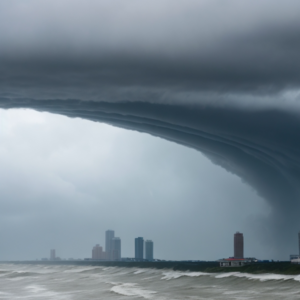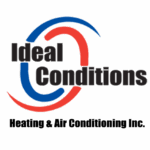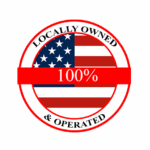Protecting and Assessing Your HVAC System After a Hurricane: A Comprehensive Guide
 Hurricane Idalia just passed Jacksonville, and while it wasn’t the horrible storm it could have been for Jacksonville, inspecting your HVAC system after serious storms is important to ensure there is no damage.
Hurricane Idalia just passed Jacksonville, and while it wasn’t the horrible storm it could have been for Jacksonville, inspecting your HVAC system after serious storms is important to ensure there is no damage.
Hurricanes are catastrophic events that can cause extensive damage, including to your HVAC system. This article provides a deep dive into HVAC maintenance, signs of AC damage after a hurricane, and actionable advice on how to protect your HVAC equipment. Read on to make informed decisions for post-hurricane recovery.
What we cover in this post:
- Why is Your HVAC System Vulnerable After a Hurricane?
- What Types of HVAC Systems Are Most Susceptible to Water Damage?
- How Does Water Damage Affect Your AC Unit and Furnace?
- What Signs of AC Damage Should You Look For?
- What Steps to Take for HVAC Maintenance After a Hurricane?
- Should You Call a Professional to Inspect Your HVAC System?
- How to Protect Your HVAC System During Hurricane Season?
- Do Warranties Cover Hurricane-Related Damage?
- How to Work with Your Home Insurance Provider for HVAC Damage?
- Final Thoughts: Key Takeaways for HVAC System Safety
Why is Your HVAC System Vulnerable After a Hurricane?
Hurricanes often bring with them a multitude of challenges, such as floodwater and wind damage. These factors make your HVAC system especially vulnerable to water damage. Outdoor units and ductwork can get flooded, compromising air quality and system efficiency. When hurricane floodwater enters your HVAC system, it can cause significant damage. The water can contaminate the air in your home or business, leading to poor indoor air quality and potential health hazards. Additionally, water can damage the electrical components of your HVAC system, causing it to malfunction or even fail.
If your outdoor unit gets flooded, the water can enter the compressor and damage its internal components. This can result in the unit being unable to cool or heat your space effectively. The ductwork of your HVAC system can also get flooded, causing water to accumulate and potentially lead to mold growth or structural damage.
To mitigate the impact of hurricanes on your HVAC system, there are a few steps you can take:
- Elevate your outdoor unit: If feasible, elevate your HVAC unit on a raised platform to protect it from floodwater.
- Invest in flood protection: Install flood protection devices, such as flood barriers or covers, to prevent water from entering your HVAC system.
- Shut down your HVAC system: Before the hurricane hits, turn off your HVAC system to minimize the risk of water damage.
- Inspect and clean your system after the storm: After the hurricane has passed, have a professional HVAC technician inspect your system for any signs of damage. They can clean and sanitize the components to ensure good air quality.
- Consider professional maintenance and protection plans: Regular maintenance can help keep your HVAC system in good condition and identify vulnerable areas that need reinforcement. Furthermore, investing in a protection plan with your HVAC provider can provide added coverage and support in case of hurricane-related damages.
In summary, hurricanes pose various challenges for HVAC systems due to potential floodwater and wind damage. Taking preventive measures, such as elevating outdoor units, installing flood protection, and shutting down the system during storms, can help minimize water damage. After the hurricane, it is crucial to have your HVAC system inspected and cleaned by a professional to restore air quality and ensure optimal performance.
What Types of HVAC Systems Are Most Susceptible to Water Damage?
Not all HVAC systems are created equal when it comes to water resistance. Gas and oil furnaces, as well as certain types of heating systems like electric furnaces, are more susceptible to corrosion and damage when exposed to water. A split system with indoor and outdoor units can also be at risk if either component is damaged.
How Does Water Damage Affect Your AC Unit and Furnace?
Water damage can lead to corrosion inside the valves and controls of your AC unit. Furnaces, particularly gas and oil versions, have controls that are especially vulnerable to water damage. The performance of your air conditioning and heat pump systems can be severely compromised if their electrical and refrigeration connections are damaged.
What Signs of AC Damage Should You Look For?
Look for indicators like watermarks underneath or within the unit, strange noises, or decreased performance to determine if your HVAC unit has sustained damage after a hurricane. If your HVAC system was exposed to flooding, it might be contaminated and impossible to decontaminate, requiring replacement.
What Steps to Take for HVAC Maintenance After a Hurricane?
Once the storm has passed, initiate a thorough inspection of your HVAC system. Focus on the outdoor unit, ductwork, and refrigerant piping. Check if your HVAC equipment has valves and controls that need to be inspected and possibly repaired.
Should You Call a Professional to Inspect Your HVAC System?
Absolutely. Consult a professional to determine whether the system can continue to be used or if parts of it need replacement. Technicians will inspect the control wiring between the indoor and outdoor parts of your HVAC system and assess the damage to your unit.
How to Protect Your HVAC System During Hurricane Season?
Be proactive in securing your HVAC system against hurricanes. Use hurricane straps to anchor outdoor units and consider building a flood-proof platform for your system. Ensuring regular HVAC maintenance can also prepare your HVAC system for adverse conditions.
Do Warranties Cover Hurricane-Related Damage?
Most manufacturers offer warranties for their HVAC systems, but these warranties do not generally cover damage from catastrophic events like hurricanes. Check with your home insurance provider to understand the coverage.
How to Work with Your Home Insurance Provider for HVAC Damage?
Document all damage and consult your home insurance provider for possible coverage or reimbursement. Keep records of all correspondence and make sure to understand what types of damage your insurance policy covers.
- Assess the damage: Take photos and videos of the damage caused to your HVAC system and any other areas in your home affected by the incident. Make a detailed list of the damages to help you explain the situation to your insurance provider.
- Review your policy: Carefully read and understand your home insurance policy, especially the sections related to HVAC coverage. Check if your policy covers perils such as fire, water damage, storm damage, or other specific incidents that may have caused the damage to your HVAC system.
- Notify your insurance provider: Contact your home insurance provider as soon as possible to report the HVAC damage. Most insurance companies have a specific claims process, so follow their instructions on how to proceed. Provide all necessary information, including the date and cause of the damage, and any details you have documented.
- Request an inspection: Depending on the extent of the damage, your insurance provider may send an adjuster to assess the HVAC system. This inspector will evaluate the cause and severity of the damage, validate your claim, and estimate the repair or replacement costs. Be present during the inspection to provide any necessary information or answer questions.
- Obtain repair estimates: Your insurance provider may require estimates from HVAC professionals to determine the cost of repairing or replacing your damaged system. Get multiple quotes from licensed and reputable contractors to ensure accuracy and fairness in the estimate.
- Understand coverage: Your insurance provider will determine whether the damage to your HVAC system is covered under your policy. They will consider factors such as the cause of the damage, the age of your system, and the specific coverage included in your policy. Familiarize yourself with your policy’s coverage limits, deductibles, and any exclusions that may apply to HVAC damage.
- File a claim: If your insurance provider confirms coverage for the HVAC damage, submit a formal claim. Fill out all necessary forms accurately and provide any requested documentation, such as repair estimates and invoices.
- Keep records: Document all correspondence with your insurance provider, including dates, times, and the names of the representatives you spoke with. Keep copies of all submitted documents, claims forms, and receipts related to the repairs. These records will be important for future reference or in case of any disputes.
- Cooperate and follow instructions: Throughout the claims process, cooperate with your insurance provider and promptly respond to any additional information or documentation they may request. Follow their instructions regarding repairs or replacements, such as using approved contractors or obtaining further inspections.
- Review the settlement: Once your insurance provider determines the amount they will pay for your HVAC repairs or replacement, review the settlement offer carefully. If you believe the offered amount is insufficient to cover the damages adequately, you may need to negotiate or provide additional evidence to support your claim.
- Remember to be patient during the process, as it may take some time to resolve the claim. Stay in regular communication with your insurance provider to ensure a smooth and timely resolution.
Final Thoughts: Key Takeaways for HVAC System Safety
- HVAC systems can be particularly vulnerable to water damage after a hurricane.
- Type of HVAC system matters when it comes to susceptibility to damage.
- Professional inspection is critical for assessing post-hurricane HVAC damage.
- Protect your HVAC system proactively with hurricane straps and regular maintenance.
- Understand your warranty and insurance options for dealing with HVAC damage after a hurricane.
Arming yourself with this information ensures you’re well-prepared to protect your HVAC system from the ravages of a hurricane, and make informed decisions in the unfortunate event of post-hurricane damage.
If you’re experiencing issues with your heating and air conditioning system after a hurricane, please get in touch with us. Our team of experienced technicians is ready to help with all your service needs. Whether you need AC repair, heating repair, or regular maintenance, we provide reliable heating and cooling services. We strive for customer satisfaction and peace of mind, ensuring your system is cool and comfortable.
Remember, when your air conditioner or furnace needs service, it’s time to call the air conditioning repair experts in Jacksonville, Florida. We are ready to help get your system back up and running, ensuring you stay cool in the summer heat. Fix your air conditioning today! Call us at 904-379-8762.


